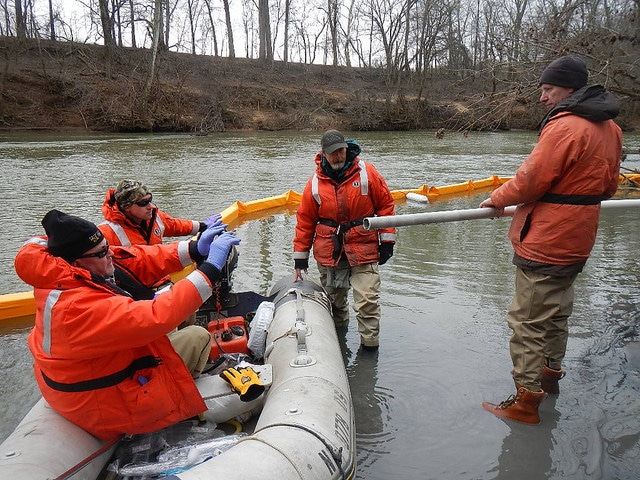A well-deserved show of gratitude to the efficient and reliable fossil fuel sources of American energy independence — oil, coal and gas — is in order, following a truly remarkable string of success stories in recent days nationwide.
On March 25, the BP refinery in Whiting, IN, leaked some 1,600 gallons of crude oil about eight miles upstream from a main drinking water inlet to Chicago. (As of this writing, investigators have not yet determined if the oil is conventional crude or heavy tar sands.)
Three days prior, on March 22, nearly 170,000 gallons of bunker fuel oil spilled into Galveston Bay, TX, from a barge, soiling one of the nation’s busiest export terminals with one of the heaviest, stickiest forms of oil on Earth. As a result, 20 containment vessels were dispatched.
And five days before that, on March 17, a Sunoco-owned oil pipeline leaked 20,000 gallons into the Oak Glen Nature Preserve in Ohio, some 20 miles from Cincinnati. To be fair, the leak was only ‘discovered’ on March 17. Nobody knows when the leak actually began, and the true amount of oil leaked will be impossible to conclude.
These impressive gains by the oil industry, however, pale in comparison to the string of breakthroughs achieved in the coal industry in recent days in North Carolina.
Since February 2, an ongoing spill at Duke Energy’s Dan River power plant has leaked more than 25 million gallons of toxic coal waste, resulting in the contamination of more than 70 miles of the Dan River. Testing has confirmed dangerous levels of arsenic and other carcinogens chemicals in the river.
Six weeks later, on March 20, state regulators cited Duke, the largest electrical supplier in the nation, for yet another achievement in helping America achieve energy independence: the company intentionally and illegally dumped an additional 60 million gallons of coal waste into another local waterway — the Cape Fear River.
The other member of the fossil fuel ‘trio,’ natural gas, is touted by the industry as the promising savior of our clean energy future. In March, its performance continued to live up to its true potential.
On March 11, a gas explosion in Trenton, N.J., killed one person and destroyed 12 townhouses.
The next day, on March 12, a gas explosion in Harlem, NY, destroyed two apartment buildings, killing eight people. New Yorkers expressed their gratitude to former Mayor Bloomberg, who championed the introduction of massive new amounts of natural gas into the least-maintained system of urban gas pipelines in the nation, prior to leaving office — to provide New Yorkers the benefits of energy independence, of course.
And finally, in Colorado, health officials are now investigating a “sudden rise in fetal abnormalities” in areas with high densities of active gas wells. The investigation, reported on DeSmogBlog, comes just weeks after the publication of a study in the journal Environmental Health Perspectives which showed an “association between density of natural gas wells within a ten mile radius of expectant mothers’ homes and the prevalence of fetal anomalies such as low birth weight and congenital heart defects in their infants.” (See the full report here: Birth Outcomes and Maternal Residential Proximity to Natural Gas Development in Rural Colorado.)
The scope of these fossil fuel successes, however, goes far beyond mere accidents, leaks and fetal abnormalities.
Seismologists report that hydraulic fracturing (aka “fracking”) is likely responsible for earthquakes, and U.S. military leaders report that oil was a major reason we went to war.
Taken together, we can all pause in gratitude and say, with reverence:
We salute you, the fossil fuel industries — oil, coal and gas: the key to affordable and reliable American energy independence — our future is safely in your hands.
Photo: Workers take a water sample after the Duke Energy Dan River Coal Ash spill. From U.S. Fish and Wildlife Service Southeast Region via Flickr
Subscribe to our newsletter
Stay up to date with DeSmog news and alerts





